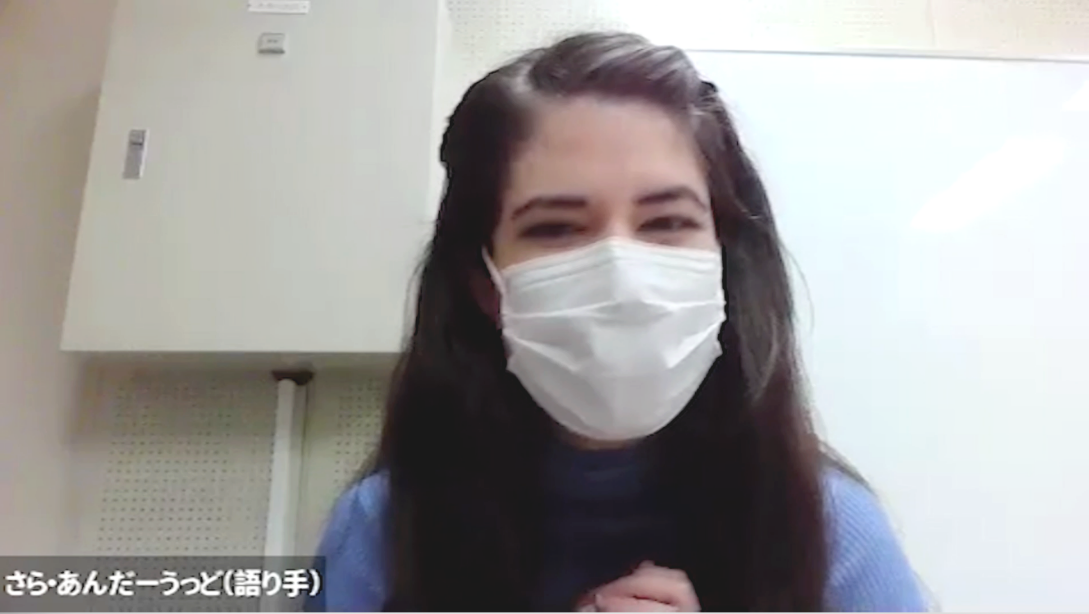
She was born in the US. She started studying Japanese in high school and then majored in Japanese language at the University of Oregon. She spent one year as an overseas student at Waseda University. After working in a bank in the US, she got a position as Coordinator for International Relations in Kodaira City in August 2019.
Moderator: Miyu Yano
Session Team: Almond Jelly
Miyu Yano (1st year, Department of Creative Innovation)
Yukiya Yamamoto (3rd year, Department of Arts Policy and Management)
Kim Do-hee (CASIO COMPUTER Co., Ltd.)
Sarah Underwood works at Kodaira City Hall as a Coordinator for International Relations.
There are probably a lot of people wondering "why Japan?" and "why City Hall?".
Sarah's first encounter with Japanese culture was when she was 7 years old. While learning to play the piano she had a Japanese piano teacher who also taught her origami and the hiragana. In junior high, she was frequently exposed to Japanese culture through anime and manga, which were becoming widely popular in the US. In high school, she took a Japanese language course and this sparked her interest in learning Japanese seriously. At university, she majored in Japanese language and International Relations before coming to Japan in September 2015 to begin a one-year stint as an overseas student. During that time, she became truly immersed in Japanese culture through her home stay and traveling around Japan with friends. But she adds that living for a long period in Japan showed her not only the good aspects of Japan, but also its less attractive side.
After that, she returned to the US and worked in a bank, and now she is employed at Kodaira City Hall as the Coordinator for International Relations. In that role, she is surveying the city's tourism assets from a non-Japanese perspective and is pushing ahead with plans for multilingual capability that will make life a little easier for overseas visitors. She's also involved in activities to give the region's children a better understanding of American culture.
Sarah will talk about her perspective on Japanese culture and about what her job entails given her background as someone who was in Japan as an overseas student, went back to the US and then came back to Japan again as a Coordinator for International Relations.
Participant: As a foreigner who is living in Japan, what do you think could be changed to make Japan an easier place to live for foreigners?
Sarah: Probably the thing that most strikes me and my friends is that, no longer how long you live in Japan or how good your Japanese is, you are still seen as a "foreigner". When people look at your face and see a westerner, many think that you don't understand Japanese, and being treated that way is really confusing. What I'd really like is just to be treated the same way as an ordinary Japanese person. For me personally, that sort of change would make life much easier.
Participant: I was intending to travel to Japan in April last year, but I couldn't because of COVID-19. I've been studying Japanese at a language school for about a year, but I'm still not very good at speaking Japanese or understanding spoken Japanese. Sarah, did you have problems communicating when you came to Japan?
Sarah: When I came as an exchange student, I couldn't speak any Japanese. So, while they normally assigned someone to interpret for me, there was no-one to help me when I was with my host family. I didn't understand any Japanese, and my host family didn't understand any English. So we communicated using gestures, like "come" and "eat". But we really wanted to talk, and I think that that desire made it possible for us to communicate somehow. When I look back on that time, I'm sure there was a lot of really strange Japanese, but if your attitude is to really make an effort to communicate, the other person will also be kind enough to talk to you. I think that alone will teach you Japanese and communicating won't be so scary.
"Knowing" and then "Reaching Out"
Miyu Yano
(1st year, Department of Creative Innovation)
I first came across the words "multicultural co-existence" in my Advanced Japanese 1-4 course. "Multicultural" and "co-existence" are both words that I cannot clearly express in a way that makes them understandable. Culture is not something that differs simply by country or by region. It also exists in everyday life in the rules we have in schools or in homes. I thought that, though the word "multicultural" might bring cultures together, it would include cultures that I don't know or understand, so it shouldn’t be interpreted as just a convenient word. As the word itself suggests, "co-existence" is about "living together". But it doesn't help me to understand what it means by "living" or what is important in life. The conversation about the definition of multicultural co-existence that we had during the kick-off meeting became a discussion on the topic, "Does mutual recognition amount to co-existence?". There was a range of different opinions, such as whether co-existence is simply knowing that the other person's culture exists, even when the cultures don't interfere with each other, or whether understanding is important to living together, even when it doesn't extend as far as mutual recognition. My own take on the words "mutual recognition" is that it just feels like someone pretending to understand, and that "multicultural co-existence" consists of knowing the differences between each culture's ways of thinking, their values and their customs, and understanding that they exist in the same community.
With the completion of the "Our Pathways Here: Encounters with Multicultural Co-existence" event that is the culmination of this project, I again gave some thought to what constitutes "multicultural co-existence". For me, "multicultural co-existence" isn't just "understanding that comes out of knowing each other". I think it also has to include "reaching out and getting involved with other people so that we grow the communities in which people can safely co-exist". Through these sessions and events, I heard Sarah's recollections of the Japanese people she met while traveling and on her home stay when she was an overseas student, as well as her telling children about American culture as a Coordinator for International Relations. I also learned that she's now producing English voice guides. So, on the one hand Sarah is adopting Japan's culture, and on the other she's reaching out to talk about her own culture. This made me realize that, to have a community in which different cultures can co-exist, it is important to not only have people who know and accept, but also to have people who reach out and actively promote.

As Overseas Students and then as Working Adults